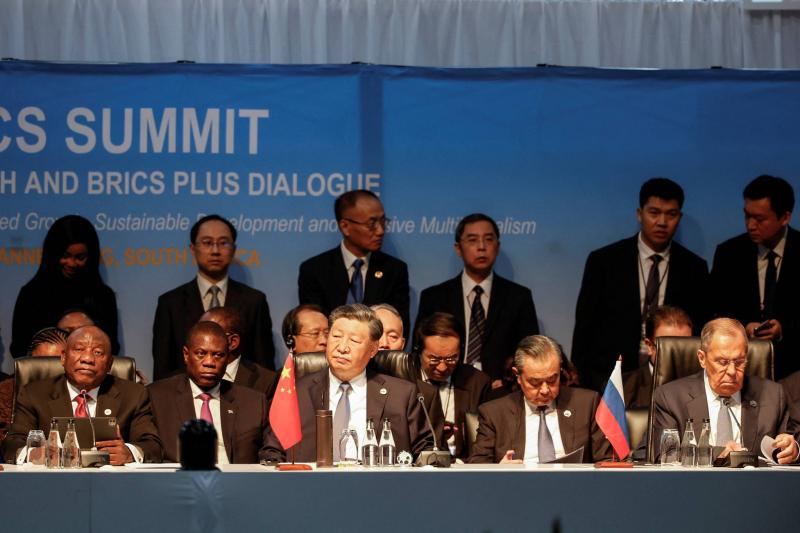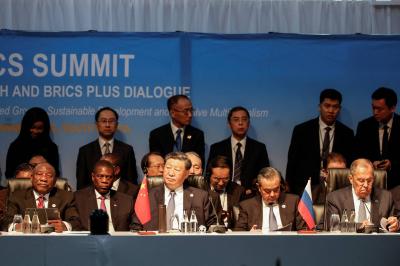The expansion of the BRICS group could be a lifeline for both Iran and Argentina, which have been invited to join the bloc and desperately need capital. However, investors and analysts say that realizing significant economic benefits for the member states of the group is not guaranteed.
Leaders of the BRICS group, which includes Brazil, Russia, India, China, and South Africa, invited Iran and Argentina along with Saudi Arabia, the UAE, Ethiopia, and Egypt to join the bloc during a summit held this week in Johannesburg, South Africa. This move aims to increase BRICS's influence as a bloc advocating for the "Global South," many of whose countries feel unfairly treated by international institutions, primarily the United States and other wealthy nations. The new expected members will include a mix of oil-rich nations like Saudi Arabia and the UAE, alongside Argentina, which is struggling with high inflation and in dire need of foreign investment, Iran, which is isolated due to Western sanctions, Ethiopia, recovering from a civil war, and Egypt, facing an economic crisis.
Some investors and economic analysts are skeptical that the expansion will lead to an increase in foreign direct investment (FDI) within the bloc. Viktor Szabo, an investment director at Aberdeen in London, stated, "Egypt was already expecting a lot of foreign direct investment from Saudi Arabia... but Gulf funds did not arrive. This is not because they are outside of BRICS, but because their offers are unattractive." However, BRICS leaders and other investors praised the economic weight that this expansion would bring. Li Keqiang, a senior Chinese foreign ministry official, said at a press conference last Thursday that the new members would raise the bloc's share of global GDP from 26% to 29%, and the trade in goods from 18% to 21%.
Ola El-Shawabi, Deputy Director of Emerging Markets Equity Strategy at Van Eck in New York, remarked, "I don't know if this will change the game, but in terms of opening consumer markets, the bloc already has that." Chris Turner, head of global markets at ING, noted that the increasing trade connectivity seemingly provides some basis for political announcements. According to ING calculations, since 2015, BRICS's share of new candidates' imports has risen from 23% to 30%, effectively replacing the Eurozone, the U.S., and other advanced economies.
Other analysts and investors argue that Iran, under Western sanctions, as well as China, which has pushed for expansion due to its significant weight as a member, are among the primary beneficiaries of this move. Yakob Egholt Christensen, a senior strategic analyst at Invest Bank in Copenhagen, said, "China, Brazil, and India will benefit in terms of easier access to oil, while Argentina, and particularly Iran, will benefit regarding access to markets and foreign direct investment."
Hossain Malik, managing director at Tillymer, a Dubai-based emerging markets research firm, stated that "the expansion at best will benefit the new entrants hungry for capital." He added, "But this assumes they will not see capital flows from the wealthier BRICS nations anyway, and that any capital offered through an institution within BRICS does not risk capital sourced from other multi- and bilateral sources." Szabo from Aberdeen noted that a loan from BRICS to Argentina could conflict with rescue funds it receives from the International Monetary Fund, which has greater financial resources.
Another goal discussed by BRICS leaders at the summit in Johannesburg was to increase the use of national currencies to reduce dependence on the U.S. dollar. The leaders indicated that this could help mitigate the vulnerability of their economies to a strong dollar and foreign exchange fluctuations. Investors suggested that the presence of heavyweight oil-producing countries among the newcomers would fuel speculation that Saudi Arabia may increasingly turn to currencies other than the dollar in oil trading. Kan Nazli, an investment manager at Neuberger Berman in London, stated, "Short-term implications in oil can be seen." He added, "If oil is priced in a non-dollar currency, or at least partially so, it represents a significant change."




